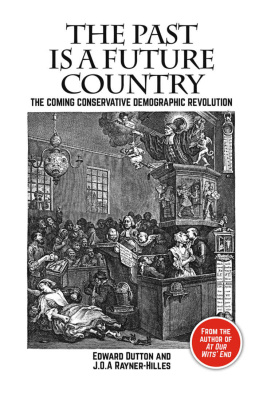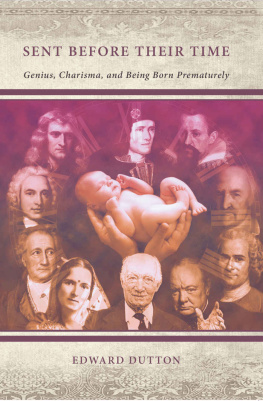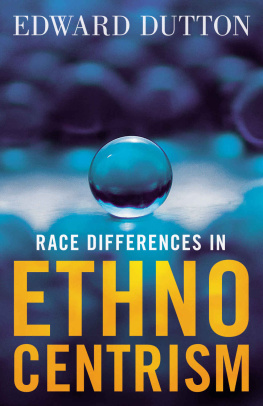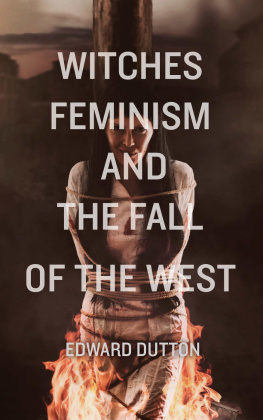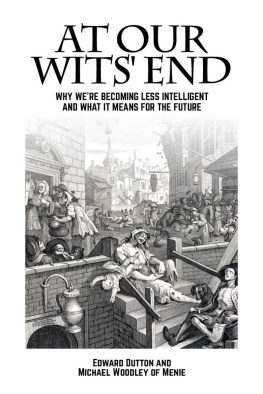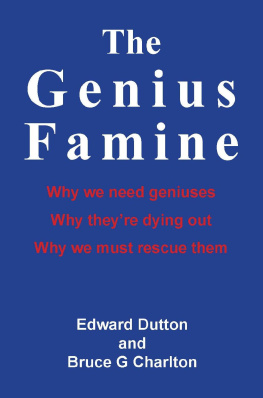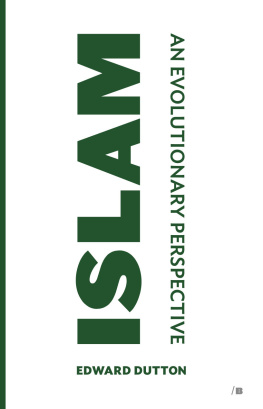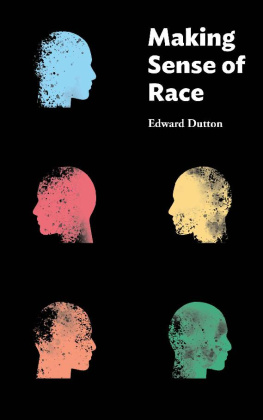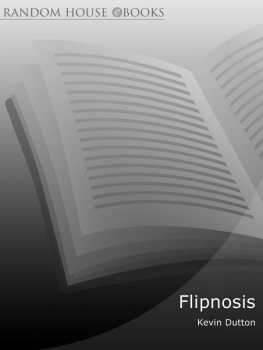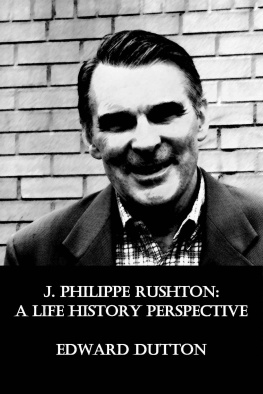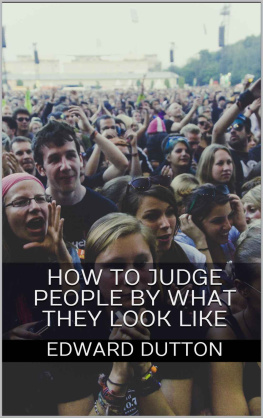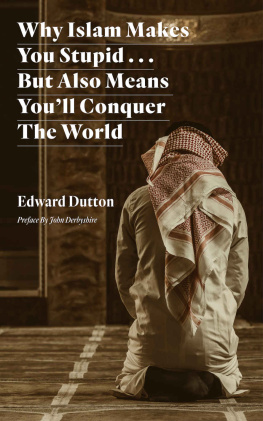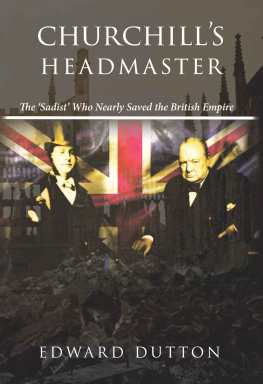Edward Dutton - The Past is a Future Country (Societas)
Here you can read online Edward Dutton - The Past is a Future Country (Societas) full text of the book (entire story) in english for free. Download pdf and epub, get meaning, cover and reviews about this ebook. year: 2022, publisher: Andrews UK Limited 2022, genre: Religion. Description of the work, (preface) as well as reviews are available. Best literature library LitArk.com created for fans of good reading and offers a wide selection of genres:
Romance novel
Science fiction
Adventure
Detective
Science
History
Home and family
Prose
Art
Politics
Computer
Non-fiction
Religion
Business
Children
Humor
Choose a favorite category and find really read worthwhile books. Enjoy immersion in the world of imagination, feel the emotions of the characters or learn something new for yourself, make an fascinating discovery.
- Book:The Past is a Future Country (Societas)
- Author:
- Publisher:Andrews UK Limited 2022
- Genre:
- Year:2022
- Rating:3 / 5
- Favourites:Add to favourites
- Your mark:
- 60
- 1
- 2
- 3
- 4
- 5
The Past is a Future Country (Societas): summary, description and annotation
We offer to read an annotation, description, summary or preface (depends on what the author of the book "The Past is a Future Country (Societas)" wrote himself). If you haven't found the necessary information about the book — write in the comments, we will try to find it.
The Past is a Future Country (Societas) — read online for free the complete book (whole text) full work
Below is the text of the book, divided by pages. System saving the place of the last page read, allows you to conveniently read the book "The Past is a Future Country (Societas)" online for free, without having to search again every time where you left off. Put a bookmark, and you can go to the page where you finished reading at any time.
Font size:
Interval:
Bookmark:
SOCIETAS
Essays in Political
& Cultural Criticism
imprint-academic.com
Published in 2022 by
Imprint Academic
imprintacademic.co.uk
PO Box 200
Exeter EX5 5YX
United Kingdom
Digital edition converted and distributed by
Andrews UK Limited
andrewsuk.com
Copyright 2022 Edward Dutton & J.O.A. Rayner-Hilles
The rights of Edward Dutton and J.O.A. Rayner-Hilles to be identified as the authors of this work have been asserted in accordance with the Copyright, Designs and Patents Act 1988.
All rights reserved. No reproduction, copy or transmission of this publication may be made without express prior written permission. No paragraph of this publication may be reproduced, copied or transmitted except with express prior written permission or in accordance with the provisions of the Copyright Act 1956 (as amended). Any person who commits any unauthorised act in relation to this publication may be liable to criminal prosecution and civil claims for damage.
The views and opinions expressed herein belong to the authors and do not necessarily reflect those of Imprint Academic or Andrews UK Limited.
The past is a foreign country;
They do things differently there.
L.P. Hartley, The Go-Between .
Come out of her, my people,
lest you take part in her sins,
lest you share in her plagues
Revelation , 18:3.
We would like to thank Dr. Michael Woodley of Menie for reading through the manuscript and providing useful feedback. This book also draws upon parts of At Our Wits End: Why Were Becoming Less Intelligent and What It Means for the Future by Edward Dutton and Michael Woodley of Menie (2018). We would like to thank Dr. Mike McCulloch for also reading through and providing insightful comments on this book. We are grateful to Dr. Gerhard Meisenberg for his comments on an early version of the manuscript and for his assistance with aspects of the data analysis. Similarly, we extend our thanks to Professor Heiner Rindermann for reading and providing his comments on the book and also to Mr. H.R. English for his helpful comments. Edward Dutton would like to thank Herr Emil Kirkegaard, as discussions with him on aspects of the manuscript have been very fruitful and he has forwarded much useful literature. Edward Dutton would also like to thank all of the drinkers at The Jolly Heretic, many of whose stimulating questions have helped him to develop his thinking with regard to aspects of the subject explored in this book. In particular, he would like to acknowledge Professor Paul Gottfried and Herr Froi Midjord, interviews with whom helped to clarify his thinking in a number of areas. J.O.A. Rayner-Hilles would like to express his gratitude to Mr. Lewis Low for locating several salient studies and assisting him in analysing the graphs. Finally, we would like to extend our gratitude to Dr. Sean Gabb for his role in bringing the two authors together.
Edward Dutton and J.O.A. Rayner-Hilles
August 2021
Sexual intercourse began
In nineteen sixty-three
(which was rather late for me)
Between the end of the Chatterley ban
And the Beatles first LP.
In many of his verses, the celebrated English poet Philip Larkin (19221985) attempted to capture the dramatic changes in Western culture that had begun to crystallize by the 1960s. For this modest university librarian, who wrote a few lines every evening after work (Rossen, 1989, Ch. 1), it was as though an Old World was passing away and a New World was not merely being born but was living through the prime of its youth.
The Old World might reasonably have been called conservative or right-wing. It firmly believed in traditional religiousness, specifically Christianity and the kind of conservative morality with which this was associated. Sexuality was something taboo and shameful; only to be explored within Christian marriage for the purposes of having children. Backed-up by Christian teaching, males and females had clear and distinct roles, ordained by God. There was an accepted social order and this was not only natural but desirable. It was believed that people were very much unequal and that they, therefore, naturally divided into social classes in a hierarchy at the top of which sat the monarch and then God Himself who, of course, existed. In fact, recognizing that people were not equal was clearly positive for society as a wholebecause people would perform the roles of which they were the most capableand that was far more important than how individuals might feel . If the best people were placed in the correct positions, then society would be more likely to triumph in the battle over resources, influence, and power with other societies. After all, the English were, essentially, an extended family who wished to ensure that they were the wealthiest and most successful of all families in the world. And their motivation for doing this was, in part, that they perceived themselves to be Gods chosen people (Purchase, 2006, p. 101) and, thus, fully deserving of world dominance, which they pursued for the greater glory of God. There were variations, such as along social class lines, in the extent to which they conformed to the relatively puritanical lifestyle to which this gave rise. The morality of the lower orders was, in fact, a matter for constant concern (McEnery, 2004, p. 72). However, this was broadly how England, and other Western countries, could be described. This happy breed of men, this little world, This precious stone set in the silver sea, Which serves it in the office of a wall, Or as a moat defensive to a house, Against the envy of less happier lands, as Shakespeare put it in Richard II (Act II, Scene I).
Around the time of World War I, this was the dominant way of thinking, though even by then it was beginning to be questioned. By 1963, it was beginning to fall apart as the culture turned to a liberal and left-wing way of seeing the world (Murray, 2012). This was characterized not only by a belief in the importance of equality, but also by an emphasis on personal freedom: on the right of the individual to live as he or she wished. Traditional religiousness, and the social order and system of morality which it upheld, began to be cast aside. The novel Lady Chatterleys Lover (Lawrence, 1960) by English writer D.H. Lawrence (18851930)privately printed in 1928 and banned in Britain for being obscenehad been published in the UK in 1960, resulting in an obscenity trial in which a Church of England bishop had argued in its favour (Mews, 2012). In 1963, this same bishopJohn A.T. Robinson (19191983), Bishop of Woolwich in southeast Londonpublished a book, Honest to God , in which he seemed to deny almost every Christian doctrine, including the literal existence of the Almighty (Robinson, 1963). By the end of the 1960s, male homosexuality was legal in England, abortion had been decriminalized, and there were growing campaigns for the rights of women and for the rights of ethnic minorities (see Goodhart, 2017).
The taboo on sexuality heavily declined over time. It became increasingly acceptable to get divorced, and even to commit adultery and to have illegitimate children. By 1994, there were female priests in the Church of England (Saunders, 18th March 1994). By the early 2000s, the ban on gays in the British army had been overturned (Jones, 2019), the age of homosexual consent had been equalized with that of heterosexual consent at 16 (Kilkelly, 2017), and by 2016 women were allowed in military combat roles ( BBC News, 8th July 2016). Then there was adoption by unmarried gay couples, which began in 2005 (Mulholland, 30th December 2005), gay marriage, legalized in Britain in 2013 ( BBC News, 17th July 2013), and, most recently, a campaign for equality for transsexuals, with the meaning of the word transphobia still needing to be explained to newspaper readers in 2009 (Tozer, 19th May 2009). This process, more broadly, has actually been termed the Great Liberalisation and it has paralleled public attitudes becoming increasingly accepting, across time, of these kinds of changes (Goodhart, 2017, p. 38).
Font size:
Interval:
Bookmark:
Similar books «The Past is a Future Country (Societas)»
Look at similar books to The Past is a Future Country (Societas). We have selected literature similar in name and meaning in the hope of providing readers with more options to find new, interesting, not yet read works.
Discussion, reviews of the book The Past is a Future Country (Societas) and just readers' own opinions. Leave your comments, write what you think about the work, its meaning or the main characters. Specify what exactly you liked and what you didn't like, and why you think so.

